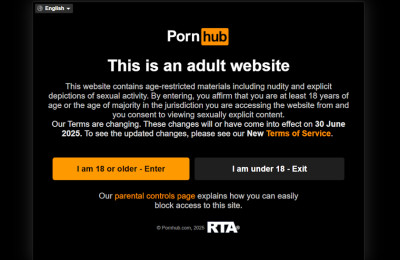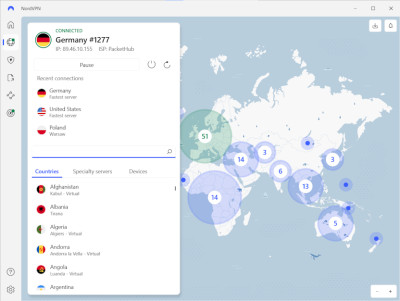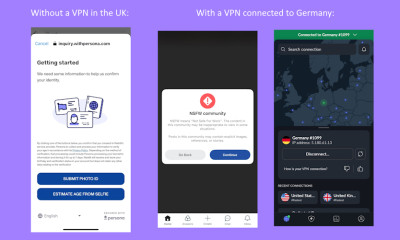As of July 25, 2025, UK users face new age verification laws when trying to access adult and harmful content online. Websites or social media platforms that host pornography and similar adult content are required to enforce age checks to protect children from digital threats.
However, such verification requirements spark privacy concerns, since they require sharing your sensitive information, like a photo ID or credit card information. To prevent data leaks or fraud, adult users are looking for more private methods to bypass verification.
One of the alternatives is using a VPN, which changes your IP address to make it look like you’re connecting from a country that doesn’t require age verification technologies.
So, I’ll guide you through the process of how to get around age verification with a VPN or other tools that don’t require sharing your personal data.
 How to bypass age verification with a VPN: quick guide
How to bypass age verification with a VPN: quick guide
- Sign up for a secure VPN. We recommend NordVPN, now 77% off.
- Download and install the VPN.
- Connect to a server in a country where age verification isn't required, like Germany.
- Access adult content platforms without intrusive age verification.
How does the age verification process work?
Age verification was created as a way to prevent minors from watching pornography or other NSFW (Not Safe For Work) content. Traditionally, it was a simple warning and confirmation of your age with a click of a button on most websites.
You can see an example of traditional age verification below.

However, according to the study by the UK’s Office of Communications (Ofcom), 8% of children aged 8-14 years old in the UK visited an online porn site in a month. This called for more effective age verifications to ensure child safety.
Some of the age verification methods under the new regulations include:
- Photo/video age estimation using technology
- Age check through the bank
- Digital identity services, like identity wallets
- Credit card check
- Email age estimation (assess what online services are used with an email address)
- Mobile age check based on age filters
- Photo ID and image matching
The risks of using age verification technologies
Although the UK age verification law is an attempt to safeguard children from porn and other harmful sites and platforms, it comes with significant concerns. Here are the main risks that come with the new age verification requirements:
- Sensitive data leaks. The new laws require sharing your sensitive personal data, like governmental IDs or biometric data, for age verification. If companies don’t handle such data properly, it may end up being hacked, leaked, or misused.
- Fraud and identity theft. Fake or insecure websites may use such requirements to steal sensitive information or scam unsuspecting users.
- Wrong age estimation. If websites only use AI-powered technologies to estimate age, it can wrongly grant or deny access.
- Easy for children to bypass. Minors who are determined to access porn content may use a parent’s credit card, mobile, or other tools to bypass restrictions. Plus, some may even be pushed to the dark web, which comes with its own set of risks, like scams or unregulated content.
With rising concerns, users are starting to look for ways to bypass the UK age verification law without sharing their sensitive data. One of these methods is using a VPN – a tool that changes your virtual location.
Will a VPN help bypass age verification?
A VPN helps bypass age verification technologies if you connect to a country where such age verification isn’t required. To explain, when your device connects to the internet, it gets assigned an IP address, showing websites and apps where you’re located.
Meanwhile, with a reliable VPN service, you can connect to a server in another country, which assigns you a new IP address. It makes it look like you’re accessing the site from a region where robust age verification isn’t necessary, letting you access adult content without sharing sensitive information.
For example, I tested how well a VPN can bypass Reddit’s photo ID verification. Here’s how I did it:
- I downloaded a mobile VPN for bypassing geo-blocks – NordVPN.
- Then, I connected to a server in Germany, which doesn’t require age verification with sensitive data.

- While connected, I opened the platform and could instantly access NSFW results without verification that involved sensitive data.

That’s it. This method also worked when I tried to access PornHub in France, which introduced similar age verification requirements as the UK.
Is it legal to use a VPN to bypass age verification?
It’s legal to use a VPN to bypass age verification unless a specific platform’s terms of service state differently. The July 2025 UK Online Safety Act doesn’t mention anything about individual users being prohibited from using VPNs for bypassing age verification.
However, Ofcom forbids companies that host adult and harmful content from promoting the use of VPNs to bypass age verification in any way.
Other ways to bypass UK age verification laws
Although using a VPN is most effective and secure for bypassing UK age verification requirements, there are a few other methods that can help users become anonymous.
Tor Browser
The Tor Browser can get around age verification as it encrypts all of its users’ traffic, routing it through multiple servers. This hides your location, letting you become anonymous and watch porn or other restricted content without verification through sensitive data.
It’s worth noting that because of its nature, the Tor Browser doesn’t always work for bypassing geo-blocks. That’s because you cannot choose the server yourself, so it’s not a guarantee that it won’t be a server in a location where the restriction applies.
Proxy
Proxies route your traffic through remote servers, making it look like you’re connecting from another country. So, just like with a VPN, you may bypass age verification on porn sites and other platforms in the UK.
Yet, if you’re choosing between a proxy and a VPN, I’d recommend getting a VPN. The main difference is the security level. With proxies, your traffic isn’t encrypted, so your Internet Service Provider (ISP) can still view your browsing activities.
How did the UK age verification law develop?
The UK’s age verification law was shaped through a multi-year process due to concern for children’s exposure to adult and other harmful online content. The first attempt to enforce age verification measures was the Digital Economy Act 2017, which was dropped due to privacy concerns.
However, robust age verification requirements were reintroduced in 2022 with the Online Safety Bill. Then, the Online Safety Act 2023 was passed, and Ofcom became responsible for its enforcement.
In 2025, Ofcom published the Protection of Children Codes, sharing age verification standards set to come into force on July 25, 2025. The law is set to be in full enforcement in 2026.
What sites have introduced age verification?
Many adult content or NSFW sites have already agreed to implement methods that the UK age verification law requires. Here are some of the popular platforms and their current position:
- PornHub. Aylo, the parent company of PornHub, confirmed that it will introduce “government-approved age assurance” methods by July 25.
- Reddit. The platform already introduced verification for adult content viewing through Persona, an age verification tool that requires a government ID.
- Discord. UK users will be able to access NSFW content only after verifying their age through face or ID scanning.
- Bluesky. The social media platform will implement payment card verification, ID scans, or face scans.
Some smaller businesses, like the Bitchute video sharing platform, are already announcing the discontinuation of their platform to UK residents. That’s because some companies cannot afford to ensure compliance and robust technologies for age verification, causing them to either shut down or geo-restrict users in the UK.


